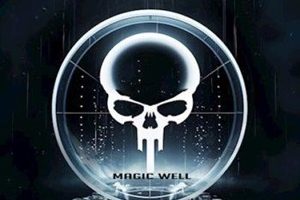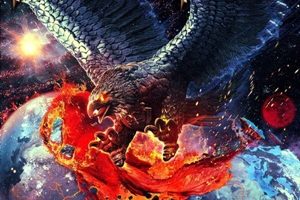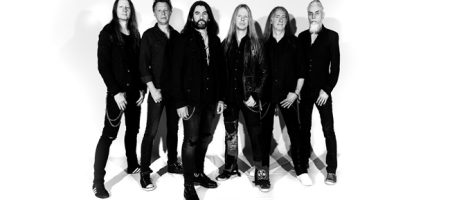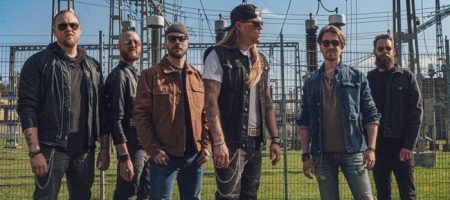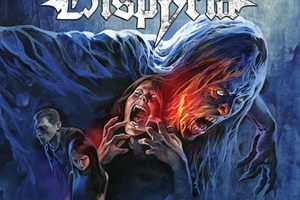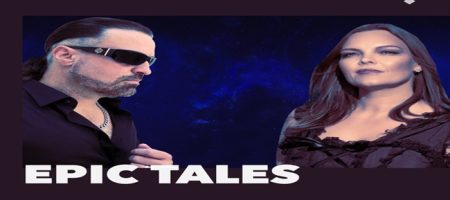Magnus Karlsson’s Free Fall – The Flame Still Burns
Thursday, 13th April 2023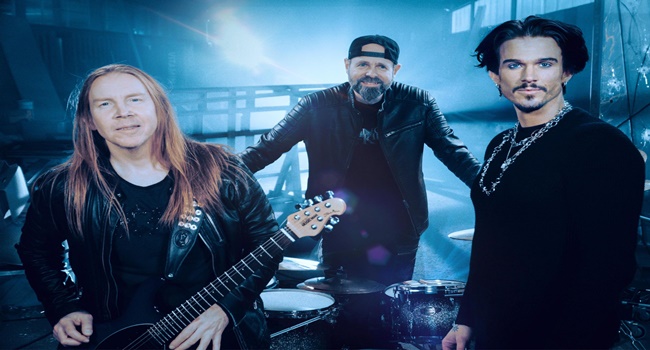
A consistent workhorse in a variety of melodic hard rock/metal styles, Magnus Karlsson seems to have his hands in multiple facets of production, songwriting, and playing year after year. His most recent release for his solo Free Fall project is Hunt the Flame – the fourth installment in this series of records that started back a decade ago through a self-titled outing. Choosing to go in a bit more progressive direction musically, he assembled eleven singers across the globe to add their professional voices to his songs – including newer notables like James Durbin, Jake E, Terje Harøy, Kristian Fyhr, and Jakob Samuelsson to name a few.
We were able to catch up with him recently to find out more about his musical development, thoughts on songwriting/production for Free Fall and his other bands/projects, his views on the current state of the music industry, a key musical school moment that shaped his professional career in the rock/metal industry, as well as what’s on the horizon for other projects/bands in the next couple of years that he has his creative hands on.
Dead Rhetoric: What are some of your earliest memories surrounding music growing up in childhood? And at what point did you discover hard rock/metal and eventually want to pick up instruments to play in bands?
Magnus Karlsson: It was quite early. I think I was around eight years old, I heard some (songs) of Iron Maiden, Judas Priest, Dio, and bands like that. I really loved that style. I tried to convince my friends when we were very young I wanted to start a band, trying to sound like Iron Maiden. It didn’t sound that good, but it was a start.
Dead Rhetoric: And was the guitar the first instrument you picked up – because you know how to play multiple instruments?
Karlsson: Yeah. In the 80’s in Sweden it was very popular to play this organ, playing with your feet and two hands. I played that kind of organ. But then when I went to music school, they didn’t have a teacher for that (instrument) so they asked me to choose another instrument. At that point I chose the guitar, that was my backup. And I’m happy I chose the guitar back then.
Dead Rhetoric: Did you take advantage of the government music programs that were available? I’ve heard in a lot of European countries, you can have rehearsal space to practice as well as teachers at very affordable to low prices…
Karlsson: Yes, that’s true. It’s cheap to have a private teacher. I’m working in the same kind of school right now as a guitar teacher. They have a very nice teacher who told me they have a nice space available in a cellar, take it if you want to use it with your band. It was a big thing for us to have our own space where we could play loud and practice in every week.
Dead Rhetoric: Hunt the Flame is the fourth installment of your Magnus Karlsson’s Free Fall project. How do you go about the specific details as far as vocalist choices when it comes to the eleven tracks for this record – and are you aware as the songwriting develops who the best fit will be track to track?
Karlsson: Yeah, I think a lot about that. This time I had some ideas, and when I asked different singers after I finished the songs and the melodies, that really helped me a lot to hear the voice in my head when I am writing. Who would sound good with high notes, or long notes, aggressive notes. I have to say I have worked with a lot of great singers, my old idols like Joe Lynn Turner, Tony Martin, all those great singers. On this album, I wanted to explore some new voices – or at least new for me. I think the only one I worked with before was Jakob Samuelsson when I did stuff before – and I had worked with Kristian before in Ginevra. Outside of that, the others are quite new to me. It’s cool to find new, great singers.
Dead Rhetoric: When it comes to the album, what are one or two songs that seemed very surprising to you when you heard the singers and their final product?
Karlsson: I’m always surprised in a positive way, even if I have very high expectations when I ask them. It’s always great when I get things back, it’s fantastic. I have to say that James Robledo was quite new to me, and it was fantastic to hear his version of “Far From Home”, the backing vocals he did at the same time were fantastic. He sounds to me almost like Russell Allen.
Dead Rhetoric: I’ve heard from other vocalists in previous talks that you are incredibly detailed when it comes to the demos that you present before going into the final product we hear on the album. What is your outlook when it comes to taking an initial idea and fleshing it out through these demos?
Karlsson: I’m sitting here in my studio in Sweden, while most of the singers I work with I don’t meet with- we will chat through means like this or through emails. I want to show my vision to them, I have to show it with demo music. If I have the best song in the world but it’s a crappy recording, it’s hard to work with different people like that. I have to produce the demo to where it sounds like it’s close to the album, so they get a lot of inspiration from it. I put a lot of work into the music, but lately I have been a bit lazier. If the singer can perform with a lot of power, when I record the vocals it will be more like Bee Gees metal (laughs). I don’t have to scream it like that, they will get the picture. There is a lot of work within the demos, that’s true.
Dead Rhetoric: Do you trust other people when it comes to the lyrics? I’ve heard this time there were more outside writers than the previous records, correct?
Karlsson: Yes, that’s true. A couple of the singers, like Jake E and Kristian Fyhr, they wrote their own lyrics. I had help from the great lyric writer from England, Jane Gould, she wrote five or six of the lyrics too. I used to spend a lot of time on lyrics, but this time I worked on the melodies and would have them find something that fits to it. That was really great. I think I will work more with other people in this capacity, instead of writing everything on my own. I don’t have the time anymore to do it.
Dead Rhetoric: How are you able to be so productive in all of these capacities and a songwriter, producer, and player – would you say you’ve established a strong work ethic and effective time management skills?
Karlsson: I try to. When I wake up in the morning and my kids go to school, I’m alone in my studio. Then I can be very creative for a while. Around lunch, I go to my other work as a guitar teacher and I continue there. That’s what I do – I don’t play golf or tennis. If I have a moment available I spend it on music. I have a studio in my home, so I can always be in here if I have time left. It’s so fun, the more I write the more ideas I get, I can write things for great singers. It’s what I want to do, it’s not hard really, it’s fun.
Dead Rhetoric: How do you separate the writing ideas – are you someone that has to focus project to project, band to band, or do you collect ideas and pick/choose based on the needs of what’s in front of you?
Karlsson: I try to separate them. If I start a new project, I want to have a clean slate, I just focus on that one, and it makes it easier and more fun. Primal Fear has a certain style, Anette Olzon has a different style, and I can go in and work fresh. Lately I have started to work on two projects at the same time, then to make that a good thing I write four or five songs on one album and then go to the other. I don’t just write songs and see where they will go in the end, I want to have a vision and a plan.
Dead Rhetoric: What do you enjoy most about working with Frontiers Music and their attitude/outlook for your work? Do you believe they have the proper understanding, knowledge, and tools at their disposal when it comes to pushing melodic rock, hard rock, and metal artists?
Karlsson: In that kind of music and style, I think they are a great label. I am so lucky that they like my style and my music. If they ask me to make an album, they never want to hear anything first, they trust me completely and that’s a great feeling. And also, with all the singers and great bands they sign, like we say in Sweden it’s a smorgasbord, I can pick and choose from everything. That’s really cool, and when I said I wanted to have eleven different singers for this album, they asked me if I needed any help with it. If I needed any phone numbers, they were willing to help me with this. They have been really great.
Dead Rhetoric: What do you feel are some of the best lessons learned over your career as a musician, songwriter, and/or producer that you think that younger musicians should pay attention to?
Karlsson: I think it’s absolutely important in all life aspects to have fun. It sounds simple, but if you don’t have fun and you want to be famous or successful, that’s almost impossible. It’s so many hours, so much time and money, so many risks that it won’t work out. That you won’t reach the goal you have. So if you have fun on the way, that doesn’t matter so much because you had a great time. That’s important to have fun all the time. I choose to have a different outlook – because I can say no to things I don’t want to do. I just say yes to the stuff that I really, really want to do. If I don’t like it, or don’t have time to do it, I just say no. That’s the great thing, to have a backup to something else.
I had a period in my life where I was just living on touring and recording, I was younger and I was playing a lot of Irish folk music and that kind of stuff. That was great too, but I came to a point where I had to take all the shit gigs, because I needed the money. Now I have the work, so I don’t have to say yes to everything.
Dead Rhetoric: That’s a balancing act as well for you. I know with Primal Fear, you are an important member with your work in the studio and the songwriting, but you have to choose when to go on the road with them because of your studio work and role as a parent.
Karlsson: That’s correct. I haven’t toured for a long time, and the pandemic came. As it looks now, I don’t think (touring) for me will happen, they have two great guitarists that play live and play in the studio more and more. I was involved in the new album with many of the songs, I took a step back this time. I heard the first mixes of the new album, and it sounds great. They have been so kind to me that I could come and go on the tours, that’s incredible.
Dead Rhetoric: What would surprise people to learn about Magnus, the person away from music when it comes to other passions, hobbies, or interests you like to engage in? And is it a balancing act between your musical endeavors and your time with your wife and children?
Karlsson: As I said, the music takes a lot of time. Right now, I’m trying to slow down as I want to have more time to hang out with my family. It’s very hard to slow down. I have a big problem turning down great projects. I have lots of stuff booked in the coming years. If I have time, I try to see my friends sometimes, and drink some beers. That’s about it.
Dead Rhetoric: What do you consider a pivotal or critical moment that took place in your life that helped shape your musical career?
Karlsson: It was over twenty years ago. I was playing in a music school that mostly played jazz. That was great, but I almost had given up the dream of playing rock music, or metal. I didn’t think about it much, but then there was a guy in the studio that heard about me, he knew I could play fast on guitar. And he asked me to play some solos with the band Midnight Sun, twenty-five years ago. I did that album in the studio, they liked my style and I started Last Tribe to do the first album. That opened a lot of doors, the final album I did with Last Tribe, Primal Fear got in touch with me. I got a lot of requests from other artists who wanted me to write stuff for them. That was a great moment to come back to the metal scene again.
Dead Rhetoric: Is it true you are working on a new Last Tribe album, the first one in a couple of decades?
Karlsson: Yes, that’s true. I’m working on that right now, Rickard the singer, he has a big studio in Sweden that records albums for Arch Enemy, Meshuggah, that kind of stuff. He will write lyrics to it, hopefully we will be done after the summer sometime. That’s the goal.
Dead Rhetoric: How do you view the state of the music industry currently? What aspects do you enjoy the most – and what areas do you believe need to be improved upon or changed for the greater good of all parties involved?
Karlsson: Since streaming took over, I don’t know where it will end really because as a listener it’s good to explore, you can find new bands easier than standing with headphones there in a record store. Even if I miss that time. I discover new music every day, I love hearing new stuff. At the same time, it makes it hard for musicians, losing money on tour, they don’t get much money for the recordings because of the streaming. My guess would be soon there will be more hobby musicians and not as many full-time musicians or bands. If that’s a good thing or a bad thing, I don’t know. It will be harder and harder to be a professional musician, absolutely.
Dead Rhetoric: What’s on the agenda for anything related to Magnus Karlsson and your various bands/projects over the next twelve months?
Karlsson: Right now we are mixing the new Primal Fear album, and I’m writing the next Last Tribe record. I am also writing the next Anette Olzon solo album. This year, I will work on the next Ginevra album with Kristian. That’s it for this year, I hope. Next year, they have asked me if there will be another The Ferrymen album with Ronnie Romero. And hopefully after that, I will do the next Heart Healer record. I think that’s the plan. I know what I will be doing for the next couple of years.
Magnus Karlsson’s Free Fall on Facebook











